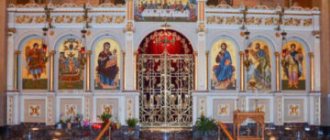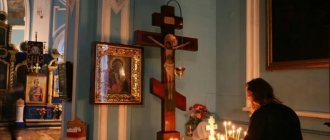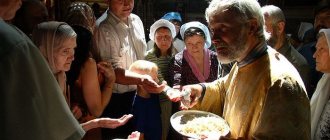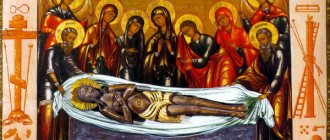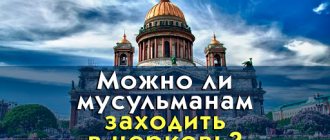Almost every woman knows that during menstruation one should not come to a sacred place - this strict rule is passed down from generation to generation, from mouth to mouth. Some strictly observe this prohibition, while others are indignant and express their indignation, reflecting on why such a church law was formed.
About the author About the book
Still others, without taking this into account, visit the temple regardless of the condition of their body. So is it permissible to visit a sacred place during menstrual flow? Where did this rule come from and why? We will try to figure this out.
Is it possible to go to church while on your period, Old Testament
Menstruation is a natural state of a healthy woman, which emphasizes the fact that she is able to give this world a child. Why then do they ask the question “Is it possible to go to the temple during menstruation?”?
Work as a courier at Yandex.Eda (up to 3,400 rubles per shift) leave a request →
In the Old Testament, a special place is occupied by the concept of purity when entering before the Lord.
Various types of diseases (leprosy, scabies, ulcers) were considered as uncleanness; various discharges in people, both female and male; touching a dead body.
A man and his wife were created by God with perfect beauty and excellent health. The death of a person is evidence of sin. The Lord is Life, and there is a ban on touching Him with anything unclean.
The Old Testament confirms this . In the book of Leviticus in the fifteenth chapter it is said that “not only wives are considered unclean during the flow of blood, but every person who touches them.”
Among the different views on this issue, one can find the opinion that menstruation was given as a punishment for the great human sin that Adam and Eve committed. At the same time, church ministers set the goal of protecting the temple and parishioners from various things that remind them that a person can be sinful and is mortal.
Become a courier of the Yandex.Food service right now (up to 3,400 rubles per shift) leave a request →
Another opinion on this issue is that menstrual flow appears due to the fact that the body gets rid of a dead egg, so to speak, from an embryo that has not matured. This is a double sign of death. At the same time, the presence of deadly objects is not allowed in the church.
In addition, there are completely opposite views: some believe that the woman was punished by the difficult process of childbirth, and menstrual flow itself is nothing more than the ability to give another person to this world.
For your information, during menstrual bleeding there was a ban not only on attending church, but also on communicating in everyday life; it was also forbidden for anyone to touch an “unclean” woman. The same applied to the husband - various acts of a sexual nature were prohibited.
After the woman gives birth, bleeding begins - a cleansing period lasting forty days.
Pagan priestesses renounced rituals - this was explained by their weakness. As it was then believed, bleeding takes away magical power.
Over time, Christianity made its own adjustments in this regard.
About the author About the book
Thus, in the Old Testament one cannot find a definite answer as to why one cannot go to church during menstruation.
On what days and at what time is it better to visit the temple?
Of course, it is impossible to give a definite answer to this question.
It all depends on what purpose you came there for. Many people like to visit an empty church when there is no service. Why? Someone is looking for solitude in the temple, an opportunity in a quiet, calm atmosphere to think about God, about eternal, enduring values, about their soul, life, to ask for help, admonition, or simply to pray. Another, on the contrary, is more attracted by the divine service: beautiful singing, splendor in the performance of sacred rites, temple architecture, icons, the characteristic aroma of incense mixed with incense smoke characteristic of the church. Some people don’t choose a special time: they came in when the need arose, or just when it happened. Someone needs the advice of a priest. There are also those who come simply out of curiosity. As a rule, people who are not yet fully churched prefer to visit only an empty church, avoiding divine services. This is fine. Not everyone can immediately and fully see the richness and fullness of the life of the Church. It was not in vain that in ancient times, everyone who wanted to join the community of believers went through the process because... the so-called catechumen (oral teaching in the fundamentals of the Christian faith), which lasted, as a rule, several (!) years. But most people still prefer to pray during worship. After all, the main wealth of the Church lies precisely in worship and the sacraments performed during worship. During worship, something is achieved that is impossible to achieve in solitary prayer: this is what is called “conciliarity”: when the entire Church prays with one voice addressed to God about everything, including about the needs of each member of the Church. Such a prayer is more likely to be heard by God. It was not in vain in ancient times when any disasters, wars, etc. happened. the whole people turned to God in a single prayer request. And this request was always heard. So, when is it better to come to church to pray during the service, or, on the contrary, to be alone? If you want to be alone, it is better to come on a weekday between morning and evening services. However, keep in mind that some churches do not have evening services on weekdays; Usually such churches are open until 17–18 hours or even longer, but they may close shortly after the end of the morning service (this is less common). Some churches where evening services are held tend to close during the day for cleaning. Try not to plan to visit the temple in the evening (after 19:00): all churches usually close immediately after the end of the evening service. On Saturdays, Sundays and holidays (meaning church holidays), churches are usually open all day, but on these days you are unlikely to be alone in the church. If you want to pray at a service, it is advisable to find out in advance the schedule of services in the temple you are going to visit. Of course, such an opportunity is not always available, so further, in the section Briefly about church services, you will read about what days and at what times services are usually held in different churches. Of course, the number of people praying in churches on different days is not the same: if you decide to visit a temple on a Sunday morning, you will most likely pray in a completely filled temple; the day before, on Saturday evening, there are usually noticeably fewer people (any church holiday, including Sunday, begins with a festive evening service on the eve of the actual day of the holiday). Of course, when there are many people praying in a church, this is wonderful (the importance of conciliar prayer has already been discussed above), but not everyone can afford to be in a church filled with people. The reasons can be very different: elderly (who, by the way, make up a considerable percentage of the total number of parishioners) and people with poor health, for example, cannot stand for a long time (besides, practically without moving; despite the fact that in any temple you can find a couple of small benches, there are usually no empty seats on them these days), someone does not tolerate the stuffiness (unfortunately, this problem is relevant for almost all churches), someone visits the temple with small children; You can’t list all the reasons. A good alternative in these cases is to attend a Saturday morning service: it is usually not crowded. Well, on weekdays the churches are almost empty. Of course, along with the obvious advantages expressed in the small number of parishioners, the preference for Saturday morning and weekday services also has one very significant disadvantage: you are unlikely to be able to enjoy beautiful singing these days. The fact is that the so-called “right choir” with good, professional singers sings only on Sundays and major church holidays (let’s not forget about the evening services the day before). However, this is not the most important thing - there are more significant things in worship. And yet, we note that visiting church on Sundays is preferable, because it is on this day that the most important Christian holidays are remembered: the Resurrection of Christ - Easter (sometimes Sundays are even called Little Easter). Therefore, if you visit a temple, or want to visit it, then at least sometimes come there on these holy days. As for church holidays, if such a holiday occurs on a weekday, the church is usually less crowded than on a Sunday, and the worshipers are mostly older people (which is understandable, since the day is usually a working day). Working parishioners try to attend evening services the day before, so there may be even more people there than on the day of the holiday itself. In any case, I would like to advise you to find out in advance at what time it is possible to visit the temple you go to, or perhaps will go to in the future. In most cases, this will be the closest temple to your work or home. Art. teacher of the Orthodox St. Tikhon's Humanitarian University Wenzel Oleg Vadimovich
What the New Testament says about going to church with your period
The words of the Apostle Paul, found in the New Testament, assure us that everything God creates is beautiful. The processes that the human body is endowed with are completely natural. Menstruation is an important sign of a healthy woman's body. It plays a significant role, which influences the pointlessness of the ban on visiting the church during this period. St. George Dvoeslov was also a supporter of this. According to him, a woman with her processes is the embodiment of natural design, so there is no point in prohibiting her from going to temple during the period of menstrual flow. The main thing has always been and is the soul, the spiritual state.
Menstruation is no longer considered unclean; it is recognized as a process that God created . In turn, the New Testament refers to the consumption of foods during meals that are prohibited by the Torah as uncleanness, which is unacceptable for the Jewish people. Pork is also considered unclean food.
Another issue that the first Christian women faced was the permissibility of communion during menstruation. Their behavior depended on their choices. Some, taking into account traditions and canons, did not touch anything sacred, while others were of the opinion that only sin could separate them from the love of the Lord.
Also in the New Testament you can find a story about how a woman during her menstrual bleeding touched God’s clothing and was healed. But the Lord did not reject it, but with acceptance said that everything that nature created was given by God, and therefore is natural.
Precautions for believers outside Russia
In many countries in Europe and Asia, attempts to contain the spread of infection have completely upended the usual way of life: schools and universities are closed, events are cancelled, bars and restaurants are empty.
New precautions are also being introduced for believers. In Rome, all Catholic churches were closed until April 3 and Sunday services were canceled - an unprecedented measure for Italy. Conservative Judaism's highest religious body has advised Jews to stop shaking hands and kissing ritual objects. For the first time in history, the square in Mecca, where the main shrine of Islam, the Kaaba, is located, was empty. Ramzan Kadyrov called on Chechen Muslims to maintain hygiene and not gather in crowds.
The attitude of the early church and the holy fathers of that time to the issue of menstruation
When the new belief emerged, this period was characterized by a lack of clear concepts in both Christianity and Judaism. The apostles no longer discussed the issue of ritual impurity. Some of them (Methodius of Olympus, Origen, the Martyr Justin) continued to believe that uncleanness is a sin. This also applied to women during menstrual bleeding.
Origen expressed his opinion about the impurity of not only menstrual flow, but also carnal pleasures. They ignored the words of the Lord that two, when they copulate, are transformed into one body (Matt. 19:5). However, his beliefs were not confirmed by the New Testament.
Saint Clement in his Apostolic Constitutions advocated that menstruation should not affect anything. He recognized the birth of a child, bleeding and bodily defects as absolutely natural things. In his opinion, various prohibitions were invented by stupid people.
Saint Gregory the Dvoeslov also supported this position.
Later, this topic became the subject of discussion at the Gangra Council. As a result, all processes that occur in the body of women were recognized as natural.
In the sixth century, Gregory the Great, Pope of Rome, joined this position. In his letter to St. Augustine of Canterbury, who raised the topic of menstruation, he indicated that these processes are not the fault of women, therefore Christian women have the right to perform various church rituals. This teaching remained relevant until the seventeenth century, until it was again replaced by a ban on visiting the temple on the days of menstrual bleeding.
What you need to do when going to the temple
Going to church is for repentance and obedience. That is why, when going to church, every Orthodox person must go through a certain procedure.
So, before going to the morning prayer service on Sunday, you need to get out of bed and thank the Lord God for giving strength and health, and for making it possible to spend this night in peace.
After this, you need to wash your face and, lighting a candle or lamp near the icon, put your thoughts in order. This means that you need to give up all the resentments and anger that have accumulated in your soul, because only in this way will your prayers be heard. It is very important to do this on an empty stomach, and you also need to go to church without eating food. The only exception is infirm people.
It is also worth taking care of your appearance. Thus, men must remove their hats before entering the church, but women, on the contrary, must cover their heads. Moreover, women should not wear a short skirt or trousers. Her clothing should be modest and cover her body.
To achieve complete obedience, you must endure the entire service from beginning to end. At the same time, you need to repent of your sins and pray to God. All this is done in the Orthodox Church while standing, since this is how a person shows his obedience.
The Russian Church of the early period - what they think about going to church with menstruation
The Russian Orthodox Church quite often put forward strict rules that related to menstruation in women or other types of discharge. The question of whether it was possible to go to church on the days of bleeding did not even arise. There was a categorical negative answer to this.
In addition, as Niphon of Novgorod emphasized, the church accepted the status of “defiled” if a child began to be born in the temple. In this case, the church is subject to sealing for three days, re-consecration and reading of a special prayer, which can be found by reading the “Question of Kirik”.
The people who were present in the temple at that moment and observed this process became unclean. In order to remove this status from oneself, it was necessary to undergo purification with the help of the prayer of the Trebnik.
If a woman entered the church without menstruation, and she began to have menstruation while she was present in a sacred place, she should leave there as soon as possible. If she did not leave the temple, then a six-month penance awaited her.
Nowadays, the cleansing prayers of the Trebnik can also be heard in churches as a sign that a child has been born.
- Funeral services for 9 days after death - rules of conduct;
- See here the rules of behavior in the church;
- How to properly take communion and confess in church - .
How does the church work and until when?
One of the most revered Russian saints is Matrona of Moscow. Matronushka, blessed Matrona, Saint Matrona of Moscow - all these are the names of one saint, revered by the entire Orthodox Church, beloved and dear to Orthodox Christians around the world. The saint was born in the 19th century and died in 1952. There are many witnesses to her holiness who saw Matronushka during her lifetime. Even today she helps those who pray; there are many testimonies about miracles after prayers in front of her icons and relics and about the appearances of the blessed Matrona in dreams to believers.
There is a pious Orthodox tradition of writing notes to Saint Matrona - like personal letters. It is known that there are prayers to the Matrona of Moscow, and simply in your own words you can ask Matronushka for help. However, according to tradition, you can write notes, examples of which you will see, and put them behind the icon in the temple or to the relics of the saint.
There is a tradition of praying for help to the Matrona of Moscow at her relics in the Pokrovsky Monastery at the Pokrovskaya (Abelmanovskaya) outpost in Moscow. This place is also known as the temple or monastery of the Matrona of Moscow on Taganka.
The relics and the monastery are open from 8:00 to 20:00 at the address: Moscow, st. Taganskaya 58. You can get to the monastery by ground transport or by metro.
It is known that there are reference sites about Saint Matrona, but the notes and comments on the Internet are not true letters from the saint. A visit to the temple or the Intercession Monastery, where the relics of Matrona reside, will become your pilgrimage, a small labor as a sign of your desire to be heard.
There is a tradition of going to Matronushka for help with flowers - a living offering to her, evidence of the sincerity of your prayer and love for the saint. You will definitely feel that Matrona of Moscow becomes like family to you, as for many people - that’s why she is affectionately called Matronushka. In the Pokrovsky Monastery there are always many bouquets of fresh flowers around the shrine (tomb) with the holy relics of the blessed one. Often priests give their blessing to take flowers laid by other people who are seriously suffering and ill as a gift from the Matrona of Moscow herself.
If possible, purchase an odd number of roses - the saint loved them during her lifetime - place them near the image or at the relics.
Buy church candles and before the image of the blessed one in the temple, read the prayer according to the text below. Talk to her as if she were alive - that’s what she asked herself.
May the Lord bless you with His grace!
